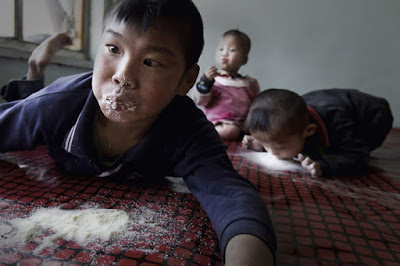Award-Winning Photojournalist Disappears In China, And Here Are 21 Of His Pics China Don’t Want You To See
ByRokas L
Boredpanda.com
Lu Guang’s photos have exposed the sides of China that its government isn’t keen on talking about: drug addicts, HIV patients, environmental problems, and so on. This time, however, the award-winning photographer has himself become the center of a story. His wife Xu Xiaoli claims she hasn’t heard from her husband since the 3rd of November.

On 23rd October, Guang flew to Urumqi, the capital of Xinjiang region, where he had planned to attend some photography events. Later, he was to fly to Sichuan to meet his friend Mr Chen to participate in a charity event. But Mr Chen was unable to find or contact the photographer.

Image credits: Xiaoli11032018
When Mr Chen asked Guang’s wife about his whereabouts, she had nothing. Investigating the situation, Ms Xu contacted the wife of the person who had invited her husband to Xinjiang. She was told both Mr. Lu and the host had been taken away by national security. Local officers from Zhejiang province, Mr Lu’s hometown, later confirmed this.

(Worker in Wuhai City, Inner Mongolia. April 10, 2005. Image credits: Lu Guang)
“He has been lost for more than 20 days”, said his wife. “As his most direct family member, I have not received any notice of his arrest,” Ms Xu said on Twitter. “I have repeatedly contacted Xinjiang police but have been unable to get through. It is our 20th wedding anniversary [next week]. We should be celebrating it together. I can only hope for his safe return. ”

(A heavy truck carrying coal and lime drives away, causing dust to fly and harming the nearby residents. Image credits: Lu Guang)
According to the BBC, Xinjiang has become notorious for its tight security controls, heavy surveillance and police presence, tackling what they describe as growing radicalism among the ethnic Uighur Muslim community. The government is sensitive to criticism and has detained reporters who were investigating negative stories about China in the past.

(Eleven-year-old Xu Li of Hutsou is diagnosed with bone cancer. Image credits: Lu Guang)
“The reality in China is you never know if you’re going to get into trouble because there are no written rules,” the photographer said in an interview last year.

(Children also live in the industrial district. China is now the world’s second-largest economy. Its economic development has consumed lots of energy and generated plenty of pollution. Image credits: Lu Guang)

(On 16 July 2010, the pipeline of the Newport Oil Wharf of Dalian Bay exploded, sending lots of oil into the sea. Many fishing boats were assigned to clean up the oil contamination for 8,150 times. Image credits: Lu Guang)
The photographer won at the 2004 World Press Photo competition for his exposure of “AIDS villages”, where people 678 people got infected with HIV after selling their blood. Out of 3,000 people, 678 have contracted HIV and 200 have died.

(On 16 July 2010, the pipeline of the Newport Oil Wharf of Dalian Bay exploded, sending lots of oil into the sea. Many fishing boats were assigned to clean up the oil contamination for 8,150 times. Image credits: Lu Guang)
The photographer won at the 2004 World Press Photo competition for his exposure of “AIDS villages”, where people 678 people got infected with HIV after selling their blood. Out of 3,000 people, 678 have contracted HIV and 200 have died.
Image credits: Lu Guang

(A woman carrying her severely ill grandson implores the sky to prevent the devil of pain returning. Image credits: Lu Guang)

(Disabled orphans adopted by charitable farmers. Image credits: Lu Guang)

(Children with cerebral palsy licks milk powder off a bed to feed. Image credits: Lu Guang)

(Laseng Temple has an over 200-year-old history, which includes the study of Mongolian medicines. It was seriously polluted by the surrounding factories, so few pilgrims go there now. Image credits: Lu Guang)

(Many factories have been moved from the country’s east to its central and western parts. Employees work in the dust. Image credits: Lu Guang)

(The Baotou Steel plant dumps mineral processing sewage into the tailings dam. Image credits: Lu Guang)


(The chemical industrial park of Yanwei Port in the city of Lianyungang dumps sewage in the sea. Image credits: Lu Guang)

(In the jeans-producing village of Xintang Town, in Guangdong, workers gain the stone for grinding the denim every morning. Image credits: Lu Guang)



(Qi Guihua, held here by her husband, fell ill when she returned to the village from Beijing to celebrate the Spring Festival. She died two hours after this photograph was taken. Image credits: Lu Guang)

(Families such as this one have sold almost everything valuable in their home to help meet medical expenses. Image credits: Lu Guang)

(A young girl warms her hands in winter. Her father is infected with HIV and still cares for five children and his elderly parents. Image credits: Lu Guang)

(Two girls prepare for the funeral of their six-year-old brother, who died from AIDS. Image credits: Lu Guang)
Cédric Alviani, the director of Reporters Without Borders’ East Asia bureau, called on China to disclose where Lu is and to “guarantee journalists’ freedom of movement and security, including in Xinjiang Province.” It has not answered yet.






.jpg)


